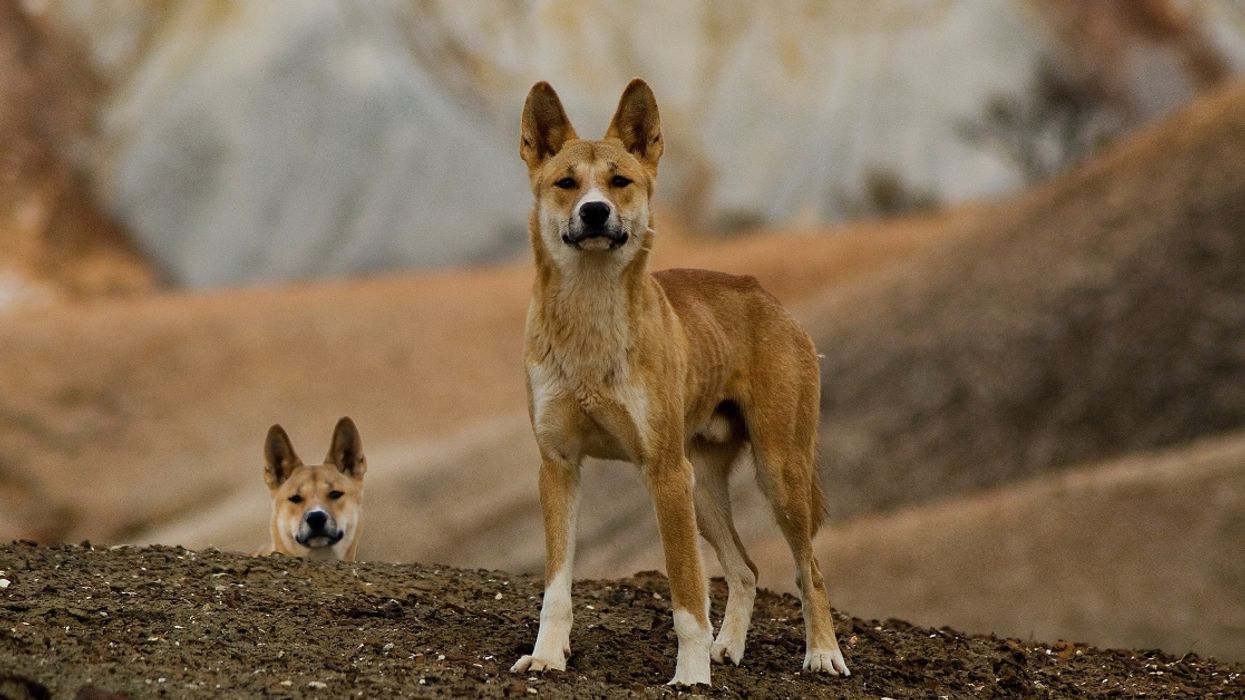In 1980 an infant named Azarea Chamberlain went missing from an Australian camp site near Uluru.
Her mother claimed dingoes had taken the baby, but the media, the public and courts didn't believe her at first.
She was eventually convicted of murder until some time later when evidence was uncovered that proved she had been telling the truth.
The wild dogs had, in fact, taken her baby as a prey item.
For years, the story was something of a joke thanks to the media attention the case garnered and shows like Seinfeld using it as a punchline.
One family in Australia just had an experience that may remind the world that it's really, really not funny.
The unnamed family was camping outside of a fenced area in a remote region of Queensland on Fraser Island. They opted to sleep in a camper van, figuring the baby would be safer in there.
They were wrong.
Park rangers explained that the parents were woken by the sound of the child crying, and noted that it seemed to be growing further away. That's when they saw a dingo dragging the crying toddler away from the campsite and towards a waiting group of other dingos.
The wild dogs, known for their intelligence and stealth, had broken into the camper van and decided the baby looked like easy prey.
"The dad got out to investigate and found the dingo dragging the toddler away. He also spotted several other dingoes near the vicinity. He immediately ran up and dragged his son and chased some of the dingoes off."
In recent years, more and more people have begun keeping dingos as pets, and animals like Dinky the Singing Dingo have softened public perception of the dingo. While it's true, they can bond with humans, it's important to remember that wild dingoes are still predators who need to be respected.
There are fenced areas for a reason and that's particularly prudent to remember when dealing with isolated populations like the dingoes of Fraser Island. This attack is the third on Fraser Island this year and we're only in April.
It's worth noting that all of the attacks involve children.
The dingoes seem to be aware that they aren't likely to successfully take down an adult human, but they are bolder when it comes to smaller, weaker children.
In January a 6-year-old boy was mauled when he climbed a sand dune. In February dingoes attacked a mother and child when they got out of their car in a remote area.
In response to the increase in dingo attacks, rangers have stepped up their patrols, but they are also asking that campers be more vigilant. Simple things like locking camper and car doors may save lives.
Here are some of the tips they are giving to campers:
- Move in groups, with children close and towards the center.
- Keep all food locked up and away from your camp site.
- If dingoes confront you, do not run. Running indicates that you are a potential prey item and may trigger an attack.















 @jennifer.garner/Instagram
@jennifer.garner/Instagram @jennifer.garner/Instagram
@jennifer.garner/Instagram @jennifer.garner/Instagram
@jennifer.garner/Instagram @jennifer.garner/Instagram
@jennifer.garner/Instagram @jennifer.garner/Instagram
@jennifer.garner/Instagram @jennifer.garner/Instagram
@jennifer.garner/Instagram @jennifer.garner/Instagram
@jennifer.garner/Instagram @jennifer.garner/Instagram
@jennifer.garner/Instagram @jennifer.garner/Instagram
@jennifer.garner/Instagram @jennifer.garner/Instagram
@jennifer.garner/Instagram @jennifer.garner/Instagram
@jennifer.garner/Instagram @jennifer.garner/Instagram
@jennifer.garner/Instagram @jennifer.garner/Instagram
@jennifer.garner/Instagram @jennifer.garner/Instagram
@jennifer.garner/Instagram @jennifer.garner/Instagram
@jennifer.garner/Instagram @jennifer.garner/Instagram
@jennifer.garner/Instagram @jennifer.garner/Instagram
@jennifer.garner/Instagram @jennifer.garner/Instagram
@jennifer.garner/Instagram @jennifer.garner/Instagram
@jennifer.garner/Instagram @jennifer.garner/Instagram
@jennifer.garner/Instagram


 @ameliaknisely/X
@ameliaknisely/X WDTV 5 News/Facebook
WDTV 5 News/Facebook r/WestVirginia/Reddit
r/WestVirginia/Reddit WDTV 5 News/Facebook
WDTV 5 News/Facebook r/WestVirginia/Reddit
r/WestVirginia/Reddit r/WestVirginia/Reddit
r/WestVirginia/Reddit WDTV 5 News/Facebook
WDTV 5 News/Facebook r/WestVirginia/Reddit
r/WestVirginia/Reddit r/WestVirginia/Reddit
r/WestVirginia/Reddit WDTV 5 News/Facebook
WDTV 5 News/Facebook WDTV 5 News/Facebook
WDTV 5 News/Facebook